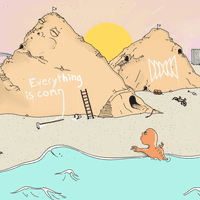
Jun 30, 2023
Sad news for all of us: producer Rachael Cusick, who brought us soul-stirring stories rethinking grief and solitude, as well as colorful musings on airplane farts and belly flops and Blueberry Earths, is leaving the show. So we thought it perfect timing to sit down with her and revisit another brainchild of hers, The Cataclysm Sentence, a collection of advice for The End.
To explain: one day in 1961, the famous physicist Richard Feynman stepped in front of a Caltech lecture hall and posed this question to a group of undergraduate students: “If, in some cataclysm, all of scientific knowledge were to be destroyed, and only one sentence was passed on to the next generation of creatures, what statement would contain the most information in the fewest words?” Now, Feynman had an answer to his own question—a good one. But his question got the entire team at Radiolab wondering, what did his sentence leave out? So we posed Feynman’s cataclysm question to some of our favorite writers, artists, historians, futurists—all kinds of great thinkers. We asked them “What’s the one sentence you would want to pass on to the next generation that would contain the most information in the fewest words?” What came back was an explosive collage of what it means to be alive right here and now, and what we want to say before we go.
Featuring:
Richard Feynman, physicist - The Pleasure of Finding Things Out
Caitlin Doughty, mortician - Will My Cat Eat My Eyeballs
Esperanza Spalding, musician - 12 Little Spells
Cord Jefferson, writer - Watchmen
Merrill Garbus, musician - I Can Feel You Creep Into My Private Life
Jenny Odell, writer - How to do Nothing
Maria Popova, writer - Brainpickings
Alison Gopnik, developmental psychologist - The Gardener and the Carpenter
Rebecca Sugar, animator - Steven Universe
Nicholson Baker, writer - Substitute
James Gleick, writer - Time Travel
Lady Pink, artist - too many amazing works to pick just one
Jenny Hollwell, writer - Everything Lovely, Effortless, Safe
Jaron Lanier, futurist - Ten Arguments for Deleting Your Social Media Accounts Right Now
Missy Mazzoli, composer - Proving Up
Special Thanks to:
Ella Frances Sanders, and her book, "Eating the Sun", for inspiring this whole episode.
Caltech for letting us use original audio of The Feynman Lectures on Physics. The entirety of the lectures are available to read for free online at www.feynmanlectures.caltech.edu.
All the musicians who helped make the Primordial Chord, including:
Siavash Kamkar, from Iran
Koosha Pashangpour, from Iran
Curtis MacDonald, from Canada
Meade Bernard, from USA
Barnaby Rea, from UK
Liav Kerbel, from Belgium
Sam Crittenden, from USA
Saskia Lankhoorn, from Netherlands
Bryan Harris, from USA
Amelia Watkins, from Canada
Claire James, from USA
Ilario Morciano, from Italy
Matthias Kowalczyk, from Germany
Solmaz Badri, from Iran
All the wonderful people we interviewed for sentences but weren’t able to fit in this episode, including: Daniel Abrahm, Julia Alvarez, Aimee Bender, Sandra Cisneros, Stanley Chen, Lewis Dartnell, Ann Druyan, Rose Eveleth, Ty Frank, Julia Galef, Ross Gay, Gary Green, Cesar Harada, Dolores Huerta, Robin Hunicke, Brittany Kamai, Priya Krishna, Ken Liu, Carmen Maria Machado, James Martin, Judith Matloff, Ryan McMahon, Hasan Minhaj, Lorrie Moore, Priya Natarajan, Larry Owens, Sunni Patterson, Amy Pearl, Alison Roman, Domee Shi, Will Shortz, Sam Stein, Sohaib Sultan, Kara Swisher, Jill Tarter, Olive Watkins, Reggie Watts, Deborah Waxman, Alex Wellerstein, Caveh Zahedi.
EPISODE CREDITS
Reported by - Rachael Cusick (https://www.rachaelcusick.com/)
Our newsletter comes out every Wednesday. It includes short essays, recommendations, and details about other ways to interact with the show. Sign up (https://radiolab.org/newsletter)!
Radiolab is supported by listeners like you. Support Radiolab by becoming a member of The Lab (https://members.radiolab.org/) today.
Follow our show on Instagram, Twitter and Facebook @radiolab, and share your thoughts with us by emailing radiolab@wnyc.org
Leadership support for Radiolab’s science programming is provided by the Gordon and Betty Moore Foundation, Science Sandbox, a Simons Foundation Initiative, and the John Templeton Foundation. Foundational support for Radiolab was provided by the Alfred P. Sloan Foundation.